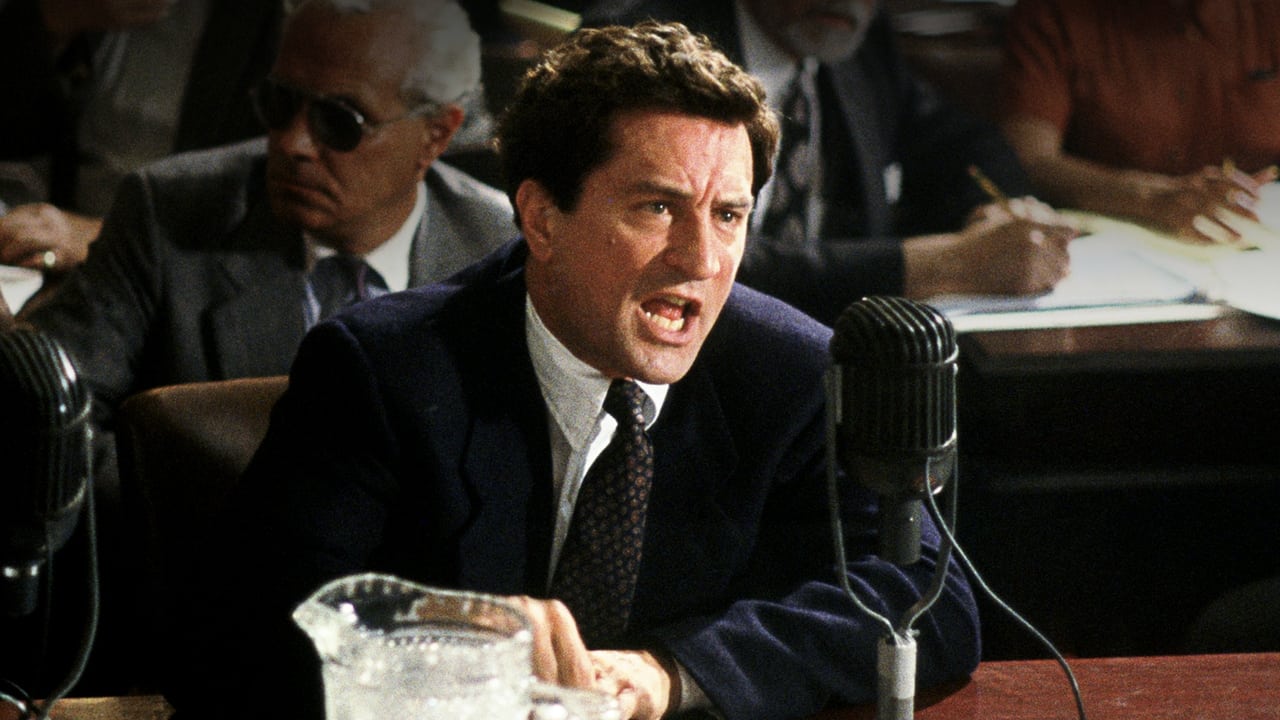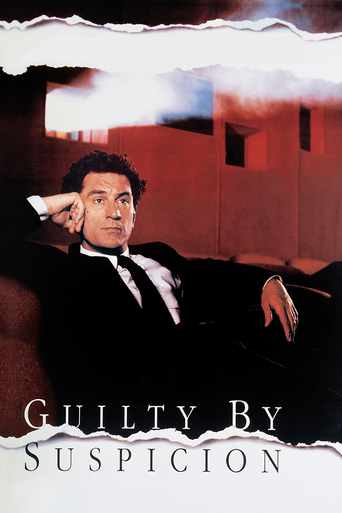

A little background to the film's time period may be helpful. It's 1951. Communist Chinese forces have pushed US-led UN forces back to the Korean border between North and South. Meanwhile Soviet troops occupy much of Europe following WWII, while Soviet scientists explode the first A-bomb outside the US. Thus, anxiety grips much of America as fears of losing the Cold War heats up. So, what are our congressional politicians doing to reverse the tide. That's a question many of the time were understandably asking. In short, the country's temperature is rising.For one thing, our guardians are zeroing in on high profile Hollywood where many Reds and their sympathizers are known to reside. After all, didn't much of the film industry support aid to America's WWII ally the Soviets. Plus, much union organizing of actors and crews before the War were led by known communists. Thus, studio moneymen had no liking for anti-capitalists wherever they resided. In short, such a background made the oncoming wave of industry blacklisting much easier. This is not a movie for everyone since the story zeros in on that single time period and the effects of the blacklist on one man, movie director Merrill (DeNiro). Nonetheless, for those with a liking for human interest and/or that crucial time period, the movie's a rare 105-minute eye-opener.Merrill's a highly successful director whose life is torn apart because he refuses to clear himself before HUAC, the congressional committee investigating communist influence in the film industry. Seems Merrill attended some party meetings during the war but never joined. Now he's being called forth to name names of those who also attended. As a result, they too can then be investigated and possibly lose their livelihoods, friends, and family. A principled man, Merrill refuses to cooperate, which means being blacklisted by the studios and a loss of assets including his ex-wife's (Bening) and son's house and home. In short, acting on conscience is costing him dearly, but can he continue to refuse as his life collapses around him. That's the crux of the plot. And it's not just a conflict between principle and success since his wife and child are also suffering because of his persistent refusal.Within limits, the movie's very well done. DeNiro refuses to go over-the-top in a role that could have easily done so. Still, for all the movie's assets-- especially a willingness to draw in a broad range of show-biz functionaries-- one crucial compromise occurs that colors the rest. In short, Merrill is made a liberal rather than a communist or even an ex-communist. Thus, deeper, more intractable, conflicts of a political and ethical nature are avoided. After all, if he were even just an ex-red, then questions could arise about his patriotic support for the war in Korea or how he might politically color the films he works on. Then too, the film avoids the highly charged Cold War atmosphere of the time, such that the basic conflict appears to involve only show-biz and overly ambitious politicos. Thus, a crucial concession is made that helps turn the upshot into a 1950's-type happy ending. That may please some audiences but still amounts to a key drawback in the movie's overall slice of historical reality. Nonetheless, director-writer Winkler's film reveals a great deal about how the highly charged period affected lives among even the most significant of Hollywood movie-makers. More importantly, it's one that should cause viewers to dig deeper into the over-arching issues raised there.
... View MoreIrwin Winkler's "Guilty by Suspicion" looks at the Hollywood blacklist, with Robert DeNiro as a director targeted by HUAC. It's well known that the Hollywood bigwigs were only too happy to collaborate with HUAC. One of the most effective scenes is when they're watching TV and see a report on the Rosenbergs, and how HUAC thinks that any pain felt by the Rosenbergs' sons is a small price to pay for national security (sounds like something that al-Qaeda or ISIS would say, doesn't it?). As for the scene where someone writes down the license plate, I understand that they did that in real life.This is one part of history that particularly needs to get remembered. When some right-wing ideologue calls for rooting out "the other" in the name of Americanism, it simply means that he wants to stay in power at all costs. It's worth noting that Franklin Roosevelt was negotiating with the Soviet Union to make sure that there would be no more wars once WWII was over, but he died and so Truman canceled those plans. Despite having negotiated the division of Europe with the USSR, Truman went along with the claims by McCarthy and Co. that the leftists helped the USSR take over Eastern Europe.Definitely a movie that I recommend. This topic took on a new relevance in the so called War on Terrorism.
... View MoreThis is an important film that never should be allowed to fall out of conscience. It is the sordid and bitter tragedy of the political persecution against writers, directors and actors of Hollywood around 1950 with devastating effects on American cinema - it never became the same again, after reaching its highest levels of artistry and quality in the 1940s. The protagonist David Merrill here is fictitious, but his fate was shared by a vast number of his colleagues, like Jules Dassin, William Dieterle, Abraham Polonsky, Charles Chaplin, Joseph Losey and many others, some never being able to come back, others making masterpieces in other countries, like France and England. The story here builds up towards the final interrogation by the committee in the end, which reaches nothing but a tumultuous quarrel of outrage and unacceptable bullying by those responsible, who are called heroes of America, one of them being Nixon, all of them being politicians. The whole spectrum of victims are exposed, like Larry Nolan, played by Chris Cooper who is forced to act against his conscience with the ruin of his family as a consequence, his wife Dorothy, a film star, being admirably played by Patricia Wettig, the perhaps most important role in the drama, illustrating the full inhumanity, Sam Wanamaker plays the lawyer who tries to find a way out without succeeding, Ben Piazza as Darryl F. Zanuck skillfully circumnavigating the dirty business of politics but without being able to evade shipwrecks, and Martin Scorsese as the director who voluntarily chooses exile to continue filming in England, possibly a portrait of Jules Dassin. The drama is deeply upsetting, this is no comedy but the most unnecessary of all tragedies in Hollywood and the one that definitely wrecked the good name of the whole film business, which up to 1950 had been flamboyantly glorious. How sad. And how important for films like this one to be made, to tell the truth after all.
... View MoreIn 1947 the House Committee on Un-American Activities began an investigation into Communism in Hollywood. Shortly after this director David Merrill returns from filming abroad. It is not long before he is targeted for having attended "a few meetings" a few years ago. The approach is softly, softly with the committee just wanting Merrill to name some more names for them. When he refuses to help, he finds himself gradually cut out of studios and projects, with fewer and fewer people willing to take his calls.The period of history around which this film is set is an interesting one and one that is worth knowing about as part of the whole "learning from history" ideal. However this is not the same as the film itself being good because unfortunately it is not what I would have liked. It relies too heavily on the informative nature of the recreation of the period rather than developing an interesting script with realistic characters. It doesn't help that the film tries to be all very serious and respectful but does rather fail and ends up coming over all earnest and self important. The script also tries not to really upset anyone who didn't take the moral stance of the fictional Merrill by just focusing on him even though it would have been a lot more interesting if it had had outrage, bitterness and realism at its heart.Winkler directs without a great deal of style and his courtroom scene is average where it should have been the best scene of the film. De Niro works his material hard and makes for an engaging lead, however it is the lack of depth and complexity in his material that limits his performance. This is more or less true of the rest of the cast which, although starry, doesn't really provide anyone in particular with an opportunity to mark themselves out. Bening, Wendt, Wettig, Wanamaker, Sizemore, Scorsese, Cooper and others are good presences but not much more than that.Overall then an interesting film in so much as it informs about an important period of history. However it is all very earnest and safe and lost a lot of potential for me. The cast is starry but the material is middle-of-the-road and didn't give anyone the complexity and outrage that the subject deserved.
... View More